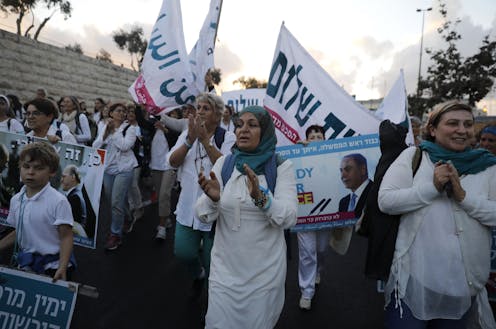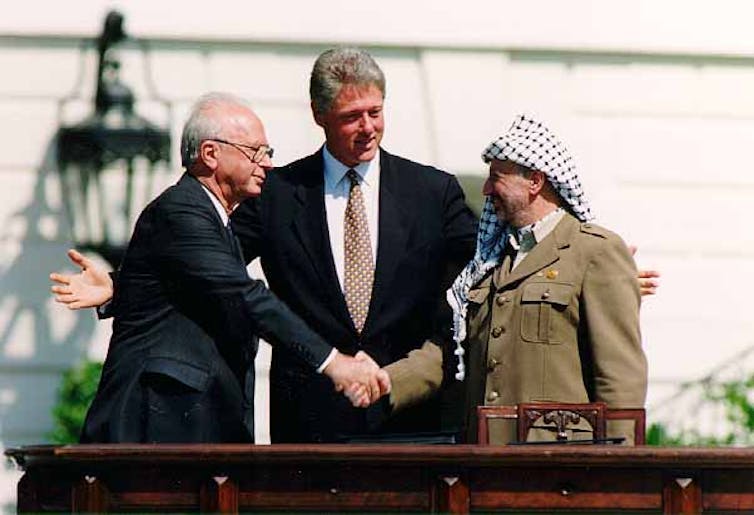Making peace between Israelis and Palestinians – is now the time for a different approach?
Nothing seems to have brought a lasting peace to Palestinians and Israelis. Two Middle East scholars suggest approaches different from what has been tried before.

The violence in May 2021 between Israelis and Palestinians was the latest deadly eruption of a decadeslong conflict that has proved immune to attempts at forging a comprehensive peace. We asked two Middle East experts to assess what can be done now to promote peace. Scholars Raslan Ibrahim, assistant professor of political science and international relations at the State University of New York at Geneseo, and David Mednicoff, chair of the Department of Judaic and Near Eastern Studies at the University of Massachusetts Amherst, both imagine there’s a way forward, though their scenarios are very different.
A peace plan based on human rights – Raslan Ibrahim
Following the cease-fire between Israel and Hamas after the Gaza conflict, the international community has become more interested in promoting the peace process between Israel and Palestine.
So far, however, the traditional approach to conflict resolution has failed to achieve peace in Israel/Palestine. But as a scholar of human rights and the politics of the Middle East, I believe it’s possible that a different approach, one that uses a human rights perspective on conflict resolution, could produce what the old approach could not.
Human rights are virtually absent in the peace agreements that have been made over the years between Israelis and Palestinians, despite the role of human rights abuses in the causes and consequences of this conflict. The Oslo Accords, signed in 1993, and subsequent peace processes demonstrate an almost complete divorce between the concepts of peace and human rights.
Multiple factors account for the exclusion of human rights in the Oslo Accords.
First, the relative power of Israel and its interest in security and stability – not human rights and justice for Palestinians – influenced the peace agreements.
Second, the Palestinian Authority, which serves as the Palestinian government in the occupied territories, tends to focus more on the Palestinian state and the right of national self-determination and less on other basic human rights, including civil and political rights and economic, social and cultural rights. Strikingly, the Oslo peace process led ultimately to the establishment of Palestinian authorities in the West Bank and Gaza that abuse the human rights of their own people.
Third, the Israeli-Palestinian conflict is generally defined as a territorial conflict. That leaves human rights as a domestic issue that would not be addressed in negotiations.
Last, the mediators apparently adopted the traditional conflict resolution approach that regards human rights as irrelevant or even in contradiction with conflict resolution practices. Clearly, this perspective has failed to end the conflict.
In contrast, what are the main elements of the human rights approach?
The human rights approach asserts that the principles and practices enshrined in the Universal Declaration of Human Rights and the Covenants – including equality and nondiscrimination; participation, inclusion and accountability; and the importance of the rule of law – should guide all stages of the peace process. Human rights principles also offer clear, objective criteria for monitoring the implementation of a peace agreement by the Israelis and Palestinians.
This approach calls for inclusivity and participation in the peace process, of not only the elites but also others, such as victims of the conflict, women’s organizations and nongovernmental organizations.
The human rights approach aims to achieve a particular type of peace that would include negative peace – the absence of war and violence. It also aims for positive peace through addressing the root causes of the conflict and building institutions and structures that create and sustain peaceful relations between Israelis and Palestinians.
Last, this approach seeks accountability and redress for victims of the conflict though a variety of mechanisms including truth commissions, reconciliation, criminal prosecutions and reparations. Past human rights abuses and injustice need to be addressed to achieve a legitimate and sustainable peace. Otherwise, the unaddressed grievances can be manipulated for future conflicts.
The human rights approach to conflict resolution is not a panacea. But it has distinctive advantages that help the negotiation process and can provide sustainable peace, security and human dignity for both Palestinians and Israelis.

A ‘grand bargain’ – David Mednicoff
The recent flare-up in the unresolved Israeli-Palestinian conflict shows both that the issue is not going away and that prospects for real progress remain bleak.
Thoughtful commentators argue that long-standing hopes for separate independent states for Palestine and Israel have been dashed by the increasing Jewish Israeli settler presence in the West Bank and the lack of will or capacity of leaders on both sides to work toward a two-state agreement.
Many experts argue that the only way forward is to assume that the two-state solution is dead and pair that with pressure to improve the economic and political status of Palestinians in Israel, the West Bank and Gaza.
But can Palestinian rights actually improve in the face of Israeli state power and the world’s inaction?
U.S. President Joe Biden’s unexpected tendency to go big in domestic policy suggests the merit of at least considering a different and more ambitious approach to the Palestinian-Israeli dispute: a grand bargain.
This idea seeks to broaden the political scope of diplomacy to address the Palestinian issue in tandem with long-term goals shared by many Middle Eastern and global states. Those include regional stability, economic growth, conflict reduction, particularly in Yemen, and resolution of the Syrian refugee crisis.
In exchange for diplomatic relations with many states in the region, Israel would broker major material improvements, and ideally an acceptable territorial home, to Palestinians.
More specifically, a grand bargain would mean that Arab countries establish relations with Israel, and Israel would provide real political autonomy and facilitate investment and economic improvements for Palestinians. The broader region, hopefully including Iran, could focus on building trade, long-term growth and improved human security.
Current regional politics open the door to such an approach. To start with, Israel’s new government after Prime Minister Benjamin Netanyahu’s election defeat could benefit from an acceleration of stable economic and political ties with other countries in the region, which is likely only if Palestinians’ conditions are addressed. Major Arab states, including Saudi Arabia and Qatar, would be better off if they could openly pursue relations with Israel. Such a shift is possible because of the opening of official relations in 2020 between Israel and several other Arab states, including the United Arab Emirates.
Meanwhile, the power most known for being a major thorn in the side to both Israel and Saudi Arabia and other powerful Arab states, Iran, might just be open to toning down its more aggressive militarism in the Middle East if trade and other economic benefits of diplomatic normalization were on the table.
A grand bargain approach is risky and labor-intensive, because working with a range of parties requires attention to more issues and diverse perspectives.
Yet the shift among Arab governments in accepting Israel in the region, Biden’s openness to large-scale policy, Iran’s relative global vulnerability and the swell of global opinion against Israeli treatment of Palestinians could constitute enough favorable conditions to make this idea an innovative alternative to the dismal status quo.
A grand bargain approach could be initiated by the combined efforts of the U.S., Europe, Saudi Arabia and other Gulf Cooperation Council states and would also likely require the engagement of Russia, Turkey and even China.
Admittedly, it would be a major uphill battle getting this range of countries to build support for major change from prominent Israelis, Palestinians and others. Yet a genuinely multilateral coalition could have the diplomatic connections and credibility to bring parties to work on a grand bargain.
Could the promise of greater overall stability and large-scale global economic aid allow key players to think broadly and cohesively toward a grand regional bargain?
Middle Eastern governments are hampered in significant ways by the fragile security, economic challenges and high military costs associated with the Palestinian and other regional conflicts. Apart from the direct loss of Israeli and Palestinian lives due to violence, the broader region is highly militarized and has lost trillions of dollars as a result of conflict. A benefit of the recent rapprochement between several Arab states and Israel is that more economic and political elites than ever before are working together and may have reason to prioritize regional prosperity over conflict.
As a scholar of Middle Eastern politics, I assume that the odds for a grand bargain in the Middle East are low. Yet Palestinians have sought to internationalize their plight precisely because they are stuck between a dead Oslo process and a vision for a one-state solution directly at odds with many Israelis’ idea of a Jewish state.
To be sure, significant initiative from a wide range of parties would be needed to get this idea off of the ground. Still, a grand bargain strategy, however challenging, offers hope of improving the long-term human security prospects of Palestinians, Israelis and others by favorably resolving their current dilemma, which might be paraphrased starkly as go big or no home.
[Understand key political developments, each week. Subscribe to The Conversation’s politics newsletter.]
The authors do not work for, consult, own shares in or receive funding from any company or organisation that would benefit from this article, and have disclosed no relevant affiliations beyond their academic appointment.
Read These Next
Atrocities take place in democratic nations as well as autocratic ones – our database has logged the
Forty years of data suggests atrocities are on the rise globally.
How do people know their interests? The shortest player in the NBA shows how self-belief matters mor
Some people seem to be born to excel at certain activities. But having opportunities to try new things…
3D scanning and shape analysis help archaeologists connect objects across space and time to recover
Digital tools allow archaeologists to identify similarities between fragments and artifacts and potentially…






